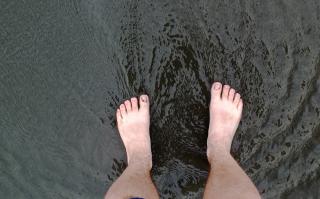Fiercely UU: Redeeming Retail
By Annie Gonzalez Milliken
Fiercely UU is a new blog series where Unitarian Universalist young adults tell stories about what our faith requires of us and how they follow that call. To be fiercely UU is to proclaim human worth and interdependence. In an individualist, greed-based, shame and fear fueled white supremacist patriarchy, we say no to isolation and oppression and yes to radical love and covenanted connection. – Ed.
Amelia Diehl, originally from Ann Arbor, MI, is a senior at Beloit College in Wisconsin studying English Literature and Environmental Communication and Arts. She has been an organizer for interfaith incarceration justice and is an active member of the UU Young Adults for Climate Justice Network. Amelia is passionate about nonviolent communication, intentional living communities, biking and drinking tea. She is also the sound editor for the new UU climate justice podcast A Light That Flickers. Follow her @amelia_diehl.
Redeeming Retail or What I Learned from Selling Shoes
by Amelia Diehl Tacked in the backroom of the shoe store where I work is a ripped part of a shirt that reads “Our work is more than our jobs,” a quote from musical storyteller Charlie King. I grew up going to the same Quaker meeting as my husband-and-wife bosses, and joined the Unitarian Universalist (UU) congregation in high school. Though retail is generally not a glorious or exciting job, it has challenged me to understand my anti-capitalist, anti-consumerist and UU views in new ways. Retail is often disheartening, exhausting, even exploitative, treated as an afterthought, a therapeutic reward or errand for the customer, or just another job to pay the bills for the employee. In one light, I am participating in undiluted, raw commodity capitalism. But in another light – one lit by a UU chalice – I refuse to let the commodified, materialistic, consumerist, capitalist system create a culture of disconnect and disregard. Though my interactions with whoever come in may seem small, it is important to recognize that our lives are made up of these moments, that I have an influence over that unremarkable, branded intersection of lives, and I can choose to act with compassion, respect and acceptance, whether or not people give that back. This is the work that I do, that I carry with me no matter what job I have, or situation I find myself in; it is an offering that doesn’t require anything in return. In my efforts to be frugal and not consume more than I claim to need, it’s not that buying “things” is inherently bad, but rather to make sure I am not valuing the accumulation of material objects over experiences and developing relationships. To not let my desire of the thing prevent me from seeing the person who can give it to me as expendable, a means to an end. Because in this voracious pursuit of growth and planned obsolescence, what endures more than any high-quality shoe, what is perpetually exchangeable, is the renewable – and renewing – energy we impart on others. At the heart of this practice is humility and patience – for others and myself. Printed on our receipts is the (arguably cheesy) phrase “service that brings you to your feet.” When we bring out shoes for people to try on, we are trained to kneel down, and unstrap and strap the sandals directly onto the foot, and then rise with them as they feel it out. Feet keep us grounded, are what connects us to the Earth. And in this position, I am vulnerable – and that calls upon a trust. We rarely get to see or understand the full arc of anyone’s life; instead, we relate in random, or sparse, collisions, glimpses of specific circumstances. Who knows where that pair will take them, where their last pair has been, how it got a hole in the sole. Sometimes people share these stories with us, reminding me that if life is a journey, I get to help people find the next shoe that keeps them walking or hiking or dancing or just enjoying shoes. It’s easy for people to take advantage of service workers. I know I’ve become frustrated in my shopping experiences. But working in retail has helped me appreciate the often underpaid generosity that service industry employees offer every day despite frequently receiving unpleasant responses in return. In light of important campaigns for fair wages like the Fight for 15, one of my bosses created a bumper sticker that reads in all caps “Lower the Maximum Wage.” It’s a humorous reminder of the inequity in our economic system where some have far too much and others not enough. I keep this financial reality in mind as I reflect on my experience. As a retail worker, I’m privileged to have respectful fair bosses and a safe working environment, which is not true for everyone. Sure, I am paid to be nice, to smile and listen to whatever the customer may throw at me. It seems forced, falsely genuine, an automatic response. I’ve brought out tens of pairs of shoes for customers who deliberate for hours, sometimes never purchasing anything. Had to juggle a handful of customers at once, all with specific needs and desires, people who complain or criticize or ignore me. It takes effort to stay calm and positive, and sometimes I have to step back; but it is in these most trying of moments that my dedication to the energy between us, and not the things, matters most. Telling people “have a nice day” has become a reflex, but I try to imagine what this might mean for them as they leave to their next destination. In repeating the motions, and seeing each interaction as an opportunity, it becomes a practice, a way to center the energy I share to others, to act on the “inherent worth and dignity of every person”. It’s just shoes. And we’re all just trying to move forward.Amelia Diehl, originally from Ann Arbor, MI, is a senior at Beloit College in Wisconsin studying English Literature and Environmental Communication and Arts. She has been an organizer for interfaith incarceration justice and is an active member of the UU Young Adults for Climate Justice Network. Amelia is passionate about nonviolent communication, intentional living communities, biking and drinking tea. She is also the sound editor for the new UU climate justice podcast A Light That Flickers. Follow her @amelia_diehl.




